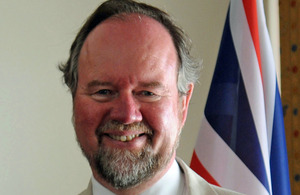Mel Plant, BA Arabic and Turkish
“I believe firmly in the two-state solution,” began Sir Vincent Fean, ex-Consul General to Jerusalem, although, he continued, it “is in very severe danger of disappearing before our eyes.” The London Middle East Institute holds talks every Tuesday evening that seem to attract people from all ranks, both within and outside of SOAS; the talk on 20th January seemed to attract even more diverse ranks, from embassy officials and politicians, to journalists and students.
Fean pressed his audience that the most viable solution for the Israel-Palestine issue would be best achieved through international recognition of a Palestinian state, leading to the framework for a viable two-state solution. Though constantly reiterating he did not speak on behalf of the government, the ex-official commented that the lack of recognition of a Palestinian state has always been “a matter of timing and judgement”, not being disputed on principle by the UK. However, he said, “it is time to choose”. With this statement, Fean urged the importance of European states, particularly the UK and France, officially recognising Palestine. The role of the UN in this process was stressed, with Fean arguing that if both those states were to do so, then four out of five of the permanent Security Council members (Russia and China in addition) will have officially recognised Palestine, encouraging others to follow in their footsteps.
Although it is not a universally shared perspective, the two-state solution in Fean’s words was expressed as a statement of solidarity with both Israelis and Palestinians. “With recognition comes parity of esteem… mutual respect, acceptance and permanence”, stated the ex-diplomat. Through continuing with respect for the Israeli state within the confines of the Green Line, he posited that it was possible for Palestinians to gain the same rights and privileges as Israelis.
Highlighting that recognition of Israel was a necessary part of the peace process meant for Fean admitting the boundaries of international powers to interfere. “Israel is more than a caretaker government”, he assured, with the same rights to 1967 borders as Palestine has to the West Bank, Gaza, and crucially East Jerusalem, and thus, Israel could not be “forced out of Palestine”. Rather, Fean’s view was that we encourage government pressure, especially through EU schemes on labelling of products, against the illegal “settlement enterprise” in the West Bank. He encouraged that an established Palestinian state, funded by the UK government in earnest, would retain its 1967 borders, share the capital of Jerusalem with Israel, and would crucially see a “full phased withdrawal” of Israeli forces and settlements (in return for land swaps) on Palestinian territories.
Unusual for British officials, Fean advocated for free elections in Palestine, without intervention from Western states, and a just refugee solution, though this was kept vague. Significantly, he passionately argued that what settlers “produce on Palestinian soil belongs to Palestinians”, and should be taxed, branded and marketed as such. With this, Fean cemented the clear fact that his three years in Jerusalem had conferred him the will to advocate for the right of Palestinians to the land. Though he refused the concept of government boycott and sanctions on Israel, Fean decided that the ICC should be utilised to target the growth of settlements, which are against the Geneva convention.
Throughout his speech, Fean maintained that the UK would and should absolutely stick to a two-state solution, mediated by regional powers with our government playing a crucial role. He asserted that the government must have a say in the end of the conflict, urging his audience to utilise their votes to support MPs who would recognise Palestine, “just as we had a say in its beginning”.
